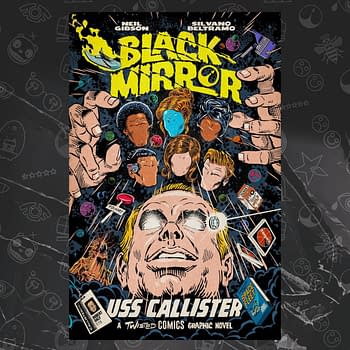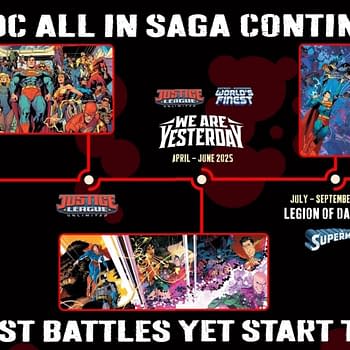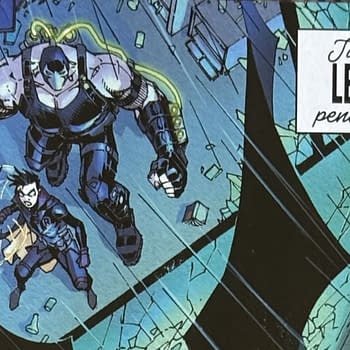Posted in: Recent Updates | Tagged:
Mike Meyer On The Apple iPad
Mike Meyer is a multi-media Renaissance man working out of West Hollywood. He creates animation, apps and all sorts of digital devices. He also published the comic book series Dirtbag and The X-Flies back in the day. He writes for Bleeding Cool after seeing Jim Lee's artistic efforts the other day. And what the iPad could mean for the industry.

Marvel Comics on the iPad looks great, the iPad screen has much richer colors than my Macbook Pro or iMac, The color temperature looks more like 4 color printing on glossy paper. Marvel Comics really underscores a lot of the weaknesses of ComiXology, though. It's really hard to find things. All of the X-titles, the different titles of Iron Man, Spider Man, the Hulk, it gets confusing pretty quickly, the titles all look the same in text or little thumbnails. There is a huge catalog to go through, it's not clear how much of it is there and how much isn't, and I so far haven't seen anything newer than 2 years old. There's no sense of the evolution of these titles, which is really important, as there are runs of most titles that you would want, and some you'd want to avoid. There needs to me more of a curatorial slant to the presentation of so much material.
The iPad has the screen real estate to actually show you a chart of all the Xmen spin-offs. If you are doing a single publisher store like this, you need to be able to browse by character, and differentiate between solo books, team-up books, and guest appearances. No Marvel Comics app should come without at least a taste of (or the option to buy) the guide to the Marvel Universe.
And the business model is out of whack. $1.99 is too expensive for a single book, and they need to offer discounted bundles for story arcs. I read the sample Astonishing X-Men on the iPhone app (oddly enough, the same titles are not free on both devices, which makes it hard to compare the experience). I liked it, but getting the 24-issue run would cost me $48. So, huh, I think, maybe I should go to my local store and see what the graphic novels run, also get a glimpse of the newer issues of the series that ComiXology isn't telling me about. My local store is an Eisner award winner retailer, one of the good guys, but they don't have them in stock. This kind of app could potentially benefit brick and mortar comic shops, but there's a missing link, and the logical next step for me would just be to order from Amazon, or maybe try my hand at the Borders Bookstore, who has a pretty good selection of graphic novels. Unless the digital version of the graphic novel is really inexpensive (since I can't share it with friends or throw it across the room when it offends me), I probably won't buy it on Comixology.
I've got a pile of programming work to tackle, and Apple just announced a press conference on April 8th which is about iPhone OS 4.0. There's a good chance that they will start making the beta version of 4.0 available that day, which will be a mad scramble for people to download and check out what's coming.
So, I won't have time to write more about the iPad just yet. You can assume that many things we know about the iPad are actually going to change dramatically with the new OS version. The experience is primarily software-driven. I'm hoping that there will be more changes to the App Store business model, things like subscriptions, lending, more complex offers (buy 3 issues of Spiderman, get this issue of Iron Man free), etc. that Apple doesn't currently support.
What few people realize about the Apple App Store is that it has necessarily inherited a lot of things from the music side of iTunes. iTunes the program and iTunes the store are somewhat overdue for a ground-up redesign that takes into account the wider selection of material now offered, and the various ways that people are getting used to purchasing items electronically. It's a big ship that's kind of hard to turn around, the iTunes back end uses literally tens of thousands of servers, and the database behind it not only manages a catalog of millions of items, it also manages billions of transactions.
It's foolish to talk much about what the iPad doesn't do, especially the complaints about the lack of multi-tasking. The iPad actually uses a full multi-tasking OS, it just doesn't make it available to 3rd party apps or the UI, this is something that can be changed in software, and Apple has pushed out numerous enhancements to the iPhone OS since its introduction. Rumor has it that multitasking will be in 4.0.
I also think that Cory Doctrow is kind of missing the point, he sees the restrictiveness of not being able to load any old software you want on the device, and/or DRM on content, but seems to be missing how empowering the device is when there are literally hundreds of thousands of apps you can get to customize it, the software is inexpensive, and the design of the device is to provide a focused, task-related experience. Jim Lee's experiment with Sketchbook Pro cost him $499 for the device and $7 for the software. A copy of Photoshop runs $600 by itself. It probably took him less than 10 minutes between opening the iPad box and drawing on it. It's a paradox, but a locked-down device can often give individuals more freedom.
Making the technology less of a computer and more of an appliance is going to make it accessible to a lot more people. Cory may love Linux to death, but few people have the skills and/or inclination to tinker at that level, and the free-for-all nature of Linux-based operating systems has fostered nothing even close to what you get from commercial software packages. Linux has fostered a lot of really nicely-done software, but it's all substitutes for commerical products, nobody has made a groundbreaking, industry-standard commercial product on Linux. The unseen hand of capitalism, I guess. Freedom is slavery, when you use Linux, you can do what you want, install whatever you want, change whatever you want, but it also means that you have to do all these things in order to get anything useful.
This, by the way, is how Watchmensch looks on the iPad…














